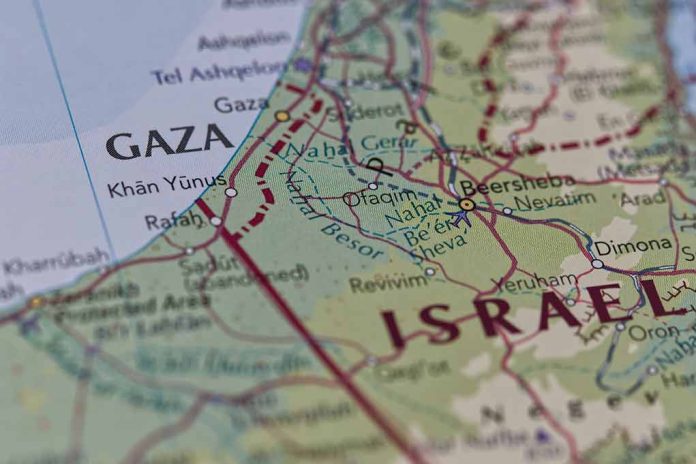
In the midst of escalating tension, Israel’s blockade on Gaza and the U.S.’s diplomatic stance intensify international debate and scrutiny.
At a Glance
- The ongoing humanitarian crisis in Gaza is exacerbated by the Israel-Hamas conflict and blockade.
- U.S. Secretary of State Antony Blinken’s efforts to navigate legal consequences for Israel’s blockade see limited success.
- U.S. military support to Israel continues amidst debate over its ethical implications regarding humanitarian guidelines.
- International aid remains scarce as Israel maintains restrictions on Gaza, defying global calls for more aid access.
Background of the Conflict
The Israel-Hamas conflict erupted in October 2023 following a surprise attack by Hamas on southern Israel, causing significant casualties and hostilities. The attack resulted in the death of about 1,200 Israelis, mostly civilians, and the taking of around 240 hostages.
Despite international relief efforts, the humanitarian situation in Gaza has deteriorated with increasing calls for a cease-fire. The ongoing blockade by Israel, lasting 16 years, has further compounded the crisis by hindering the provision of necessities to Gazans already dependent on aid.
https://www.youtube.com/watch?v=WVZbu5LSyLI
U.S. Diplomatic Interventions
Amid these challenges, U.S. Secretary of State Antony Blinken sought to address the humanitarian impact of the blockade. Issuing a 30-day ultimatum, he urged Israel to alleviate aid restrictions, expressing concern over blocked assistance and forced evacuations.
However, despite the ultimatum, the blockade persisted. Israel enforced a limit to the entry of aid to only 37 trucks per day in October, short of the 350 trucks Blinken sought to ensure.
Humanitarian and Legal Implications
The UN and other humanitarian organizations alerted the public to the deteriorating conditions, with Israel being accused of breaching U.S.-backed aid obligations. The International Court of Justice directed Israel to restrict civilian casualties without imposing a cease-fire.
The ethical debate in the U.S. over continued military support arises from apparent contradictions between standing by an ally and upholding humanitarian standards. Critics argue that U.S. law might necessitate halting weapon sales to nations preventing aid access.
The unfolding crisis underscores the integration of geopolitical and humanitarian concerns, which raises critical questions about international aid, armed conflict, and global diplomatic relations.
Ongoing developments in the Israel-Gaza situation continue to challenge diplomatic norms and humanitarian policies, with significant implications regionally and globally. The future calls for careful diplomatic maneuvering and thoughtful policy decisions that prioritize human rights above geopolitical aspirations.









